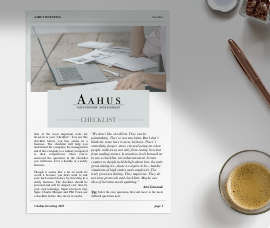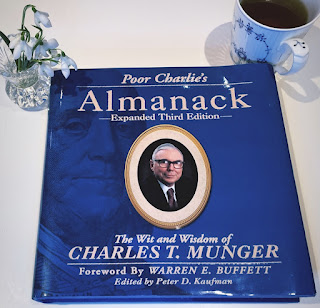When should I sell my shares?
The article about when we should sell, starts with a story and food for thought: Visiting Warren Buffett’s house in a quiet neighbourhood in Omaha, got me thinking about the importance about having calm surroundings as intelligent investors. The calm neighbourhood is lush and green with trees, and it almost felt like being in a park or forest: calm and safe. As value investors we’re in a unique situation because we are not day traders or speculators, we don’t need to act fast; we are not a part of the fast-paced environment of Wall Street in downtown New York City. It’s in credibly important that we don’t make a swift decision and sell (or buy for that matter).
I didn't lose money in any of the scenarios, where I ended up selling, because I had bought at a margin of safety.
Of course, I would prefer to stay an owner of the company, but I’m not holding back of making the call if I believe that the intrinsic value of the business will decrease.
We must understand our reason for selling, get focused on the selling case and only act when we are certain that our selling parameters are met. Put ourselves in a quiet, safe and calm environment.
In this article I’ll share my strategy of when I sell shares of my wonderful business as well as give some mental nourishment, so you don’t panic and sell at the worst time.
In this article I’ll share my strategy of when I sell shares of my wonderful business as well as give some mental nourishment, so you don’t panic and sell at the worst time.
My selling strategy
As a value investor I invest in businesses I want to own forever. This is unlike other trading strategies, where some might use technical indicators and others just buy a stock and wait, hope and pray it will go up and then panic-sell at a time where either the market is up or down with no set strategy. I’ve been there so I’m no better than anyone. But today I have a set strategy, I’ve had some thoughts (that I wrote down) about how much I’m willing to lose.
For you is it 30% of your investment you’re willing to lose before you hit the sell button? 60% or 90% - how much? Write it down and follow through. But don’t panic-sell when the market drops, you need to keep your cool and do some research before you sell. Please, also be aware that my strategy doesn’t work for you if you’ve invested in a company you heard of on the news, in a group on Reddit or at the water cooler at work. This strategy only works for value investments where we research the company (our checklist), we understand the business and the intrinsic value, management has integrity – the company is a winner – and we buy at a margin of safety.
I do not panic-sell when the stock market is crashing. I investigate the event that is happening, and I do my due diligence first. I’ve not had to sell a company during a crash, but I’ve had to sell a couple of months after a crash, where the event (Covid) started to impact the business. At the time the market was back up at a new high. I realize that I one day most likely will have to take a loss with a value investment. Even super investors like Warren Buffett and Guy Spier have described their losses. Most important thing is to learn from your loss.
As mentioned, I buy and hold the stock forever. Unless any of these scenarios occur, then I consider selling:
- A future strategy is changed or worse: abandoned.
- The business model has changed.
- The company starts losing money.
- They accumulate more than 3 years of long-term debt (debt/net income).
- If the company is acquired by another company.
- The CEO (Chief Executive Officer) or CFO (Chief Financial Officer) has stepped down and new management has been appointed.
- I no longer trust that the business or the industry will be relevant in the future.
If any of these listed events happens, I investigate the impact for my company in depth and decide if I want to stay based on the changes or if I want to sell my ownership of the business. I’ve been in situations where the strategy was abandoned and paused and I disagreed with the decision, so I sold, a company appointed a new CEO and I followed the situation closely to ensure the new CEO had integrity, intelligence and energy, I have sold my position in a credit card company because the future of payments is uncertain and many new payment methods are entering the scene (this have a very long horizon but until the future of the payment industry is certain I’m not investing – rule number 1: Don’t lose money), and I have sold because a company took on 8 years of debt (after the Covid-19 lockdown in the summer of 2020).
I didn't lose money in any of the scenarios, where I ended up selling, because I had bought at a margin of safety.
Of course, I would prefer to stay an owner of the company, but I’m not holding back of making the call if I believe that the intrinsic value of the business will decrease.





Comments
Post a Comment